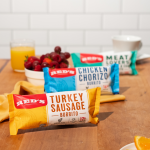Next Gen Foods Raises $20M Ahead of U.S. Launch of Plant-Based Chicken

Plant-based food startup Next Gen Foods announced this week that it has raised $20 million in a seed round extension following a $10 million seed round in February. The Singapore-based company plans to use the new capital to hire over 50 employees in the San Francisco Bay Area ahead of the U.S. launch of its plant-based chicken brand, Tindle.
New investors in the round include Global Fund GGV Capital, Chinese food tech venture fund Bits x Bites and Asian food and beverage company Yeo Hiap Seng. Existing investors Temasek, who led the company’s seed round in February, and K3 Ventures also participated, with Temasek’s former director Rohit Bhattacharya joining the company as CFO and board member as part of the deal. The new funding brings the company’s total funding to date to $32 million, which includes $2.2 million of founder capital when the company launched in October 2020.
Tindle’s flagship product is Tindle Thy, a non-GMO and cholesterol free dark meat chicken alternative. Made with soy, wheat gluten and wheat starch, the product utilizes Lipi, a proprietary blend of “plant-based fats and flavor,” including sunflower oil, which the company says allows the product to smell, taste and cook like chicken. Tindle Thy debuted in 11 restaurants in Singapore in March and has since expanded to 70 eateries across Singapore, Hong Kong and Macau, with plans to be in five international markets by the end of 2021.
In the U.S., Next Gen is aiming to launch Tindle Thy in foodservice within the next year before eventually entering into retail.
Co-founder and CEO Andre Menezes said the company decided to extend its seed round after witnessing an “extremely positive” reception for the product, adding that the capital will allow the company to build “a leading global plant-based foods company while accelerating our expansion plans.” New investors will also help the company access additional markets, he said. To accompany the U.S. launch, the company will be expanding in the Asia-Pacific region and the Middle East, as well as establishing a R&D center in Singapore to develop new products.
GGV Capital managing partner Jenny Lee said in a press release that the founders’ previous experience in the plant-based meat space gives Next Gen Foods an advantage in the increasingly competitive market. Menezes was previously the general manager of Singapore-based food importer Country Foods, which distributes Impossible Foods outside of the U.S.. Co-founder and chairman Timo Recker is founder of meat alternative brand LikeMeat, which was acquired by plant-based meat platform company LiveKindly Collective last year.
“The NextGen team has one of the strongest founder-market fits in FoodTech, having previously developed and successfully launched a plant-based meat product for the European market,” Lee said. “The team’s focus on product quality, brand recall, and distribution provides a strong foundation for the future growth of the company.”
Upon launching in the U.S., Tindle is set to enter a plant-based meat market which saw sales increase over 45% to $1.4 billion last year, according to a report by the Plant Based Food Association and Good Food Institute. The company said it intends to hire more than 50 team members across R&D, supply chain logistics and finance and marketing, all of whom will be primarily based in the San Francisco Bay Area. While it currently operates a manufacturing facility in the Netherlands, Next Gen Foods aims to establish production partnerships in the U.S., Europe, China and Brazil in the future, Menezes said.
Having proven successful in Singapore, where it competes against U.S. market leaders like Beyond Meat and Impossible Foods, the brand is hoping to leverage that track record when it arrives in the States.
“These leading brands have built hugely successful brands, proving demand for plant-based beef and pork. There is however a product gap for plant-based chicken,” Menezes said. “With Tindle we have been able to make a mark and differentiate ourselves in markets like Singapore and Hong Kong. We are confident of being able to stand out from the existing brands in the U.S. as well.”
While plant-based burgers and grounds continue to be the most popular meat alternatives in the U.S., several companies are working to meet consumer demand for chicken alternatives. Last week, Beyond Meat debuted its new Beyond Chicken Tenders at 400 restaurants nationwide, while mycelium-based meat alternative maker Meati raised $50 million to bring products including a chicken breast alternative to market next year.
















